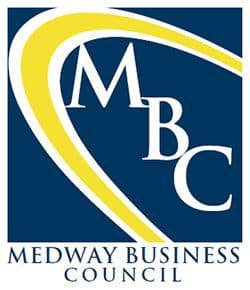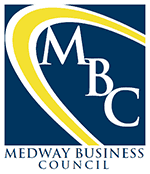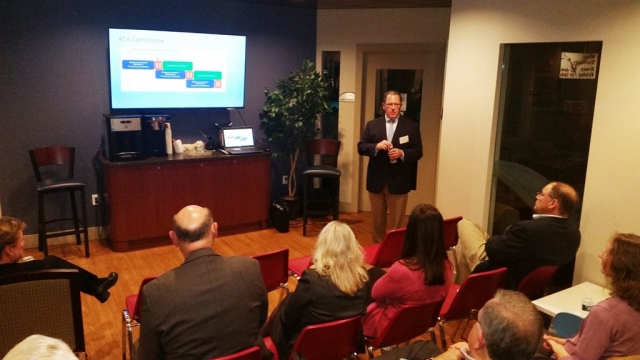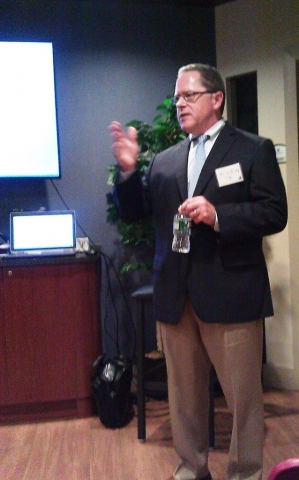Meeting Recap: Compliance Reminders for FLSA OvertimeLaw , ACA, and MA Sick Time Law
There are many areas that business owners and management teams need to focus on. One area that is continually evolving is the area of Human Resources and compliance with a wide range of state and federal workforce laws.
On November 9, Charles River Bank graciously hosted Medway Business Council’s event featuring Brian Brady of Sage, an international provider of payroll services for businesses of all sizes. Brian reviewed three laws that businesses need to be aware of:
- FLSA Overtime Law, effective December 1, 2016
- Affordable Care Act (ACA), ongoing implementation
- Massachusetts Sick Time Law, implemented in July 2015.
Here is a summary of the key points of Brian’s presentation. If you are a business owner and not familiar with the details of these laws and have questions about compliance, be sure to seek council through your payroll provider, accountant or legal advisor.
FLSA “White Collar” Overtime Law
- The new FLSA overtime law goes into effect December 1, 2016!
- Employers must be sure all employees are classified correctly as it pertains to the new FLSA overtime law.
- Current minimum exempt salary = $23,660 / year
- New minimum exempt salary = $47,476 / year
- While most employees must be paid minimum wage and time and ½ for overtime, some employees can be classified as exempt from these requirements. The most common way to classify employees as exempt is with one of the “white collar exemptions”. Among these, the most commonly used are the Executive, Administrative, or professional exemptions.
- These exemptions may be applied when the position/employee passes three tests:
- They perform non-manual work and their primary duties are executive, administrative, or professional
- They make a minimum salary of $455/week, which equals $23,660 ($913/week and $47,476/year starting December 1)
- They are paid on a salary basis, meaning they receive the same pay each week regardless of number of hours worked, or quantity or quality of their work
- Some employees whose duties qualify them for the professional exemption – bona fide teachers and practicing doctors or lawyers – do not have to be paid a minimum salary, or on a salary basis; they only have to pass the duties test.
- Another way employees can be exempt is if they qualify as a highly compensated employee (HCE). This exemption may be applied if the employee passes similar test.
- They perform non-manual work, and customarily and regularly perform at least one or more executive, administrative, or professional duties
- They receive total compensation of at least $100,000/year ($134,000 beginning December 1st
Affordable Care Act
- In 2016 all employers with 50 or more FTE (full time equivalent) employees are considered to be an ALE (applicable large employer) and are subject to all penalties associated with the Affordable Care Act.
- To determine the FTE of all of your part time or variable hour employees, simply add up all of their hours for a 30-day period and divide by 120.
- All applicable large employers should be aware of their measurement period, administration period, and stability period.
- All ALE’s must decide to Pay or Play! To pay you decide to pay a fine to the IRS and not offer any insurance to your employees.
- For those who decide to play It’s all about eligibility and affordability. All FTE employees are eligible, it’s your variable hour employees you have to monitor. Those VHE who work over 130 hours in any given month are eligible for an offer of insurance. As for affordability, your employees portion of their monthly health benefit premium cannot exceed 9.5% of their total monthly household income.
- 1094C and 1095C – IRS forms. The 1095C must be maintained for every eligible employee on a monthly basis for each 12-month measurement/stability period. Both forms are filed with the IRS much like annual W2 forms.
MA Sick Time Law (July 2015)
- One hour of sick time is earned for every 30 hours worked up to a maximum of 40 hours of earned sick time.
- An employee can carry over up to 40 hours of earned sick time into the next calendar year but never use more than 40 hours of earned sick time in any calendar year.
- Employers with 10 employees or less are not responsible for paying for earned sick time but must allow an employee to use it as needed.
- Employers with 11 or more employees must pay for earned sick time used up to 40 hours per year.





